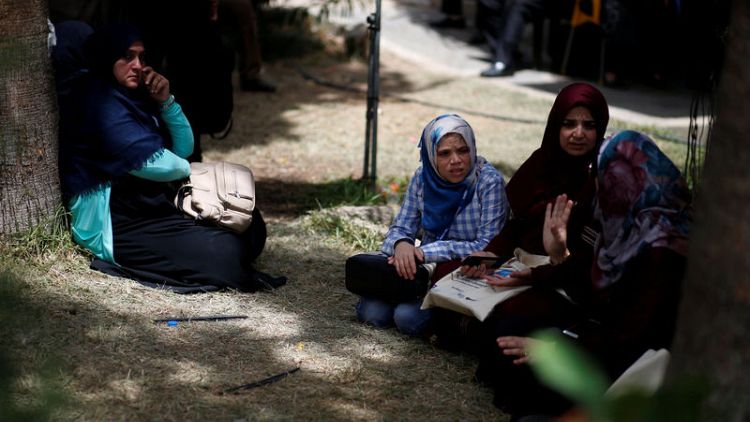By Nidal al-Mughrabi
GAZA (Reuters) - The United Nations agency that helps Palestinian refugees said on Wednesday it would reduce jobs in Gaza and the West Bank at the end of this month following U.S. budget cuts.
The job losses, which trade unionists say will eventually affect 1,000 people, have been prompting protests in Gaza.
UNRWA faces a cash crisis since the United States, long its biggest donor, slashed funding to the agency, providing just $60 million of a promised $365 million this year.
U.S. President Donald Trump withheld the aid after questioning its value and saying Washington would only give aid if the Palestinians agreed to renew peace talks with Israel. The State Department said the agency needed to make unspecified reforms.
"The American administration's decision to withhold $300 million had a deep impact on UNRWA's ability to cater to Palestine refugees' needs, whether through the regular services or emergency services," said Sami Mshasha, a spokesman for the U.N. Relief and Works Agency for Palestine Refugees in the Near East, speaking in Jerusalem.
The agency also provides assistance to Palestinian refugees in Lebanon, Syria and Jordan, but the measures being taken now "apply only to the West Bank and Gaza," said Mshasha.
He said that for the past six months UNRWA has been running emergency programmes in Gaza and the West Bank from its regular funding. It could no longer continue, so took the "difficult decision" not to renew the contracts of emergency staff after July 31.
From those working on its emergency programmes in Gaza, UNRWA said that around 280 would be kept on, mainly to continue the agency's food handouts to around half of the Gaza Strip's two million people. Part-time posts would be offered to around 580, and 113 would be let go when their contracts expire in August. In the West Bank 154 people hired on "now depleted emergency funds" would be laid off.
Mshasha said no final decision would be taken until mid-August on whether UNRWA could open schools at the start of the next academic year. The agency operates around 700 schools, educating 500,000 refugee children in Gaza, the West Bank, Lebanon, Syria and Jordan.
Chris Gunness, another UNRWA official, said the agency had "mobilized political and financial support around the globe" as it tried to maintain essential services despite the "largest ever reduction in funding" it had ever faced.
A deficit of US $446 million deficit had been cut to US$ 217 million after a pledging conference in June, he said.
"UNRWA, its dedicated staff, and the refugees have only one option - to face up to this situation together and preserve the most important work we do," he said.
The job cuts have already sparked protests in Gaza.
"This is a death sentence for us," said Sabri al-Malawani, who held up his termination letter at a protest outside an UNRWA office. "In one moment they ended my work, which I did best over 12 years."
Amal al-Batsh, deputy chairman of the employees' union, said 1,000 employees would eventually be affected by the job cuts.
Founded in 1949, UNRWA serves an estimated five million Palestinian refugees in the Israeli-occupied West Bank, in Gaza, Syria, Lebanon and Jordan. It is funded mainly by voluntary contributions from U.N. member states. [Graphic: http://tmsnrt.rs/2CLooyv]
(Additional reporting by Stephen Farrell; Editing by Stephen Powell)
